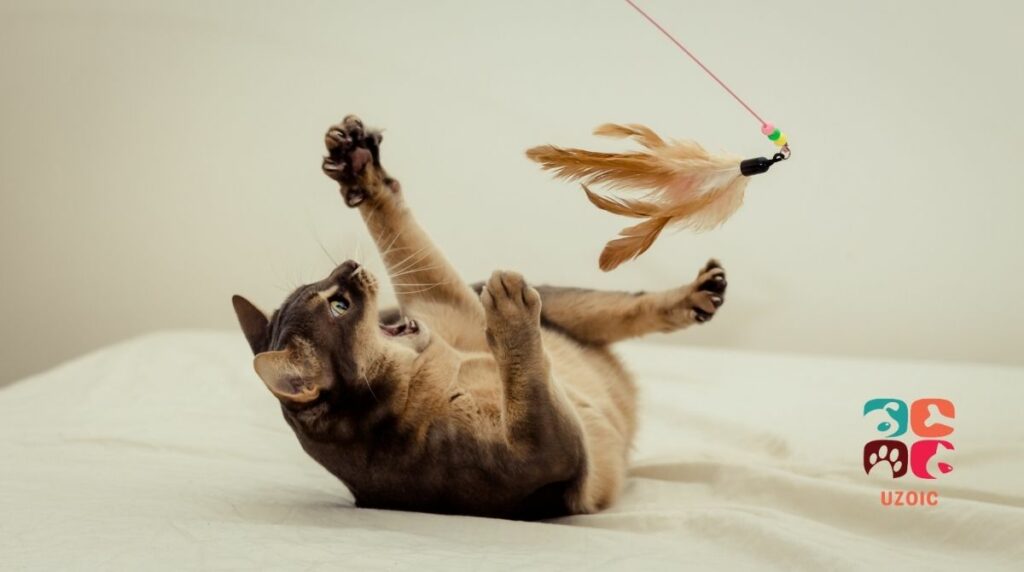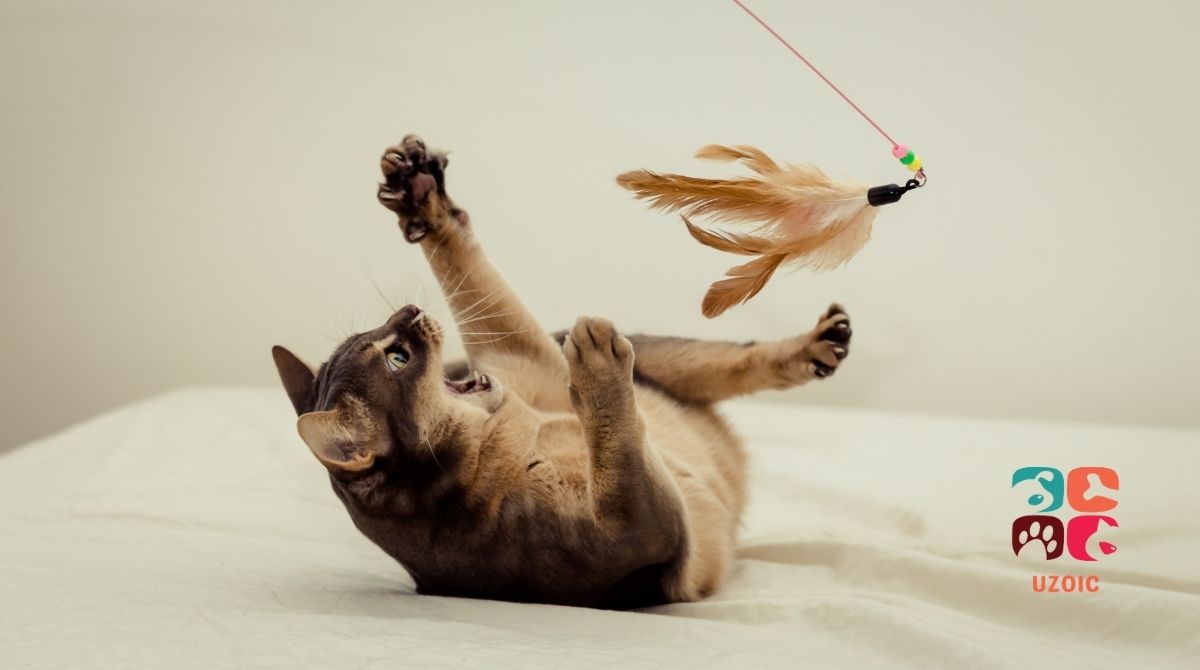So your cat ate a feather! Now what? It can be a scary situation, but do not worry – we are here to help! In this blog post, we will discuss the dangers of feathers for cats and what you can do to ensure your cat’s safety. We will also provide some tips on keeping your cat from eating feathers in the future.
Cats are naturally curious creatures, and that often means they put things in their mouths that they should not. For example, houseplants can be toxic to cats if ingested. While feathers do not typically pose a serious threat to your cat’s health, there are some dangers to consider. First, if your cat ingests a feather, it could become stuck in their throat or digestive tract.
If your cat has eaten a feather, you should first check for any signs of choking. If the cat has trouble breathing or swallowing, it is important to seek medical attention immediately. Even if your cat appears to be fine, it is always a good idea to take them to the vet to be sure.
Table of Contents
What Happens If A Cat Eats A Feather?

When a cat ingests a feather, the quills of the feather can become lodged in the digestive tract. It can create a blockage that prevents food and water from passing through if this happens. The blockage can be life-threatening in severe cases and may require surgery to remove the quills. In addition, feathers can also carry bacteria that can cause an infection if they are ingested. Therefore, it is important to monitor your cat closely if they have eaten a feather and seek veterinary care if they start to show signs of illness.
Cats are curious creatures, and they often like to chew on things that they shouldn’t. If your cat has eaten a feather, there is no need to worry. The feather will likely pass through their digestive system without any problems. In fact, many cats actually enjoy the taste of feathers and will seek them out as a treat. However, if your cat has eaten a large number of feathers, they may start to experience tummy troubles. In this case, it is best to contact your veterinarian for advice. Overall, eating a feather is not dangerous for cats, they hunt thousands of birds every year in the United States [Source: Nature] so there is nothing to be concerned about.
Are Feathers Dangerous For Cats?
No, feathers are not dangerous for cats. But there is a chance that it will get lodged in their digestive system, which can cause a blockage. If this happens, it is important to seek medical attention immediately.
Many cats enjoy playing with feathers, which can actually benefit their physical and mental health. Feathers provide cats with stimulation by encouraging them to engage in activities like stalking, pouncing, and chasing. This helps to improve their focus, coordination, balance, and reflexes. Moreover, since feathers are lightweight and fun to play with, they can help to keep cats active and engaged without being too strenuous or stressful.
They also enjoy hunting birds for food and may ingest some feathers which should be ok.
Can Feathers Cause A Blockage In Cats?
Yes, feathers can cause blockages in cats. This occurs when a cat ingests small feathers either lodged in the felines’ throat or get swept up into the stomach. The obstruction can lead to choking, digestion issues, and even infection if there is a puncture in the esophagus or stomach wall.
In some cases, feather-stuffed toys may even get accidentally swallowed by cats, triggering a blockage. Additionally, suppose your cat regularly hunts and feeds on small birds. In that case, it may also ingest feathers as part of its diet.
Whatever the cause, having too many unprocessed feathers in the intestines can lead to serious problems like an obstruction or gastric torsion. Suppose you notice that your cat has eaten feathers or shows signs of discomfort after eating. In that case, it’s important to consult your vet right away for treatment options.
To prevent this from happening, cat owners should be mindful of potential risks such as swallowing feathers during playtime and make sure that their pet’s food and water dishes are free from any stray feathers. Ultimately, it is best to keep pets away from small feather toys to minimize their risk of experiencing an obstruction.
Can Cats Digest Bird Feathers?
No, cats lack the necessary enzymes for breaking down keratin, which makes up the majority of bird feathers so a cat cannot digest bird feathers. It should pass the feather normally as in its poop. However, if the cat has not passed the feather in 48 hours, it may be sufferings from an intestinal blockage. If this happens, you should seek vet attention immediately.
My Cat Ate A Feather From A Toy!
If your cat ate a feather from a toy, don’t panic! Cats are known for their love of chewing on things, and feathers are no exception. While it’s unlikely that eating a few feathers will cause any serious problems, you should keep an eye on your cat in case they start to experience stomach pain or constipation. If your cat does start to show signs of illness, contact your veterinarian right away. In the meantime, try to keep your cat away from any toys that contain feathers.
Will My Cat Vomit Out The Feather It Ate?
While it can be a bit of a bummer to see your cat playing with a feather toy, only to watch in horror as they eventually manage to swallow the feathers. While there is certainly a chance that your cat will indeed spit out the feather they ate, there are also other factors to consider. Whether or not your cat spits out the feather may depend on how long it has been since they swallowed it. In general, though, it is best not to take any chances and to seek treatment from your vet if you notice that your cat has ingested something that is potentially harmful. With their expert help, you can determine whether or not the feather will come back up and how best to treat your cat if possible.
So while it is certainly possible that your cat will spit out the feather they ate, you shouldn’t assume this and should instead take action as soon as possible. After all, you wouldn’t want them choking on something they couldn’t digest!
How Can I Prevent My Cat From Eating Feathers?
If your cat is a habitual feather-eater, there are a few things you can do to discourage them from eating feathers. First, try to provide your cat with other toys and chewables that they can enjoy. If your cat is chewing on feathers because they are bored, this will help to keep them occupied. You can also try spraying feathers with a bitter-tasting spray that will deter your cat from chewing on them. Finally, make sure to keep any feathers out of reach of your cat so they cannot get to them.
Eating a feather is not dangerous for cats and is nothing to be concerned about. However, if your cat has eaten a large number of feathers, they may start to experience tummy troubles. In this case, it is best to contact your veterinarian for advice.
Also read: My Cat Is Leaving Food Crumbs: What’s Wrong?
Conclusion
From our personal experience, our cat has eaten more than a hundred pigeons in its life time. It usually eats a quarter and leaves the feathers alone. Sometimes, it eats the feathers as well. We have not experienced any problems and the cat has never fallen sick. So eating birds and feathers should be considered a natural part of their diet. However, it is true that the feathers may cause blockages so just monitor your cat for signs of illness after they’ve eaten feathers. To its advantage, cats are excellent at vomiting out stuff it cannot digest. So either it will vomit, or pass it in the stool. If you notice tummy discomfort or difficulty in eating / drinking, seek appointment with vet right away.
We hope you found this post helpful! Thank you for reading! Until next time, take care of those feline friends of yours!
You may like:
- Why Is Your Stray Kitten Not Eating?
- How Do I Get Rid Of My Cat’s Black Eye Crust?
- When Should I Let My Kitten Roam The House?
- Is It Cruel To Have Only One Cat?
- Why Does My Mother Cat Bite Her Kittens?


